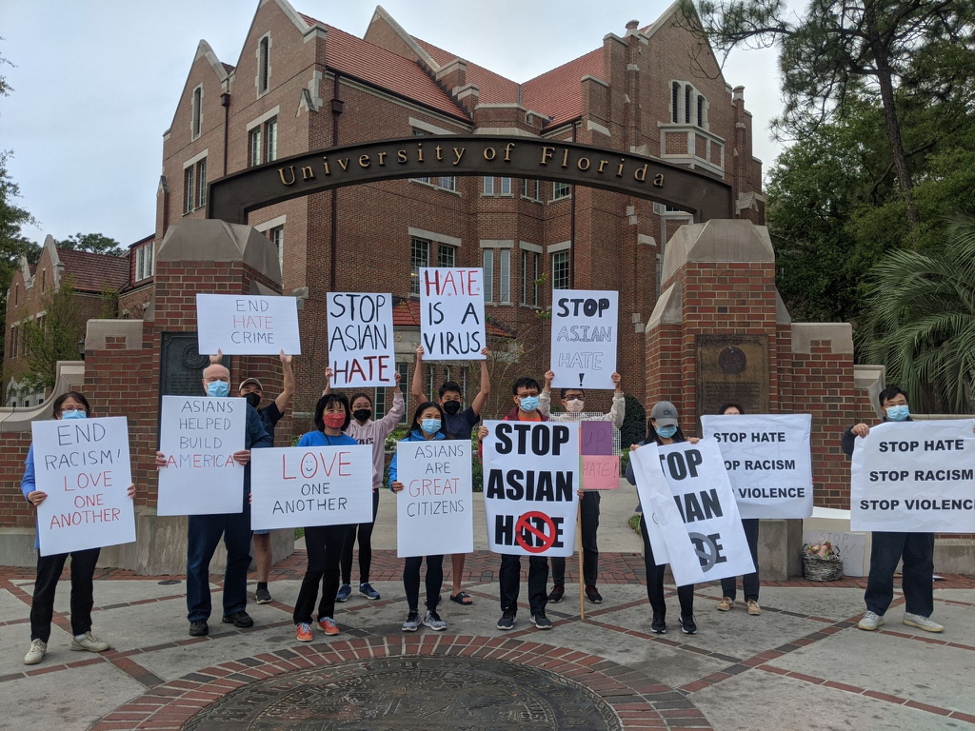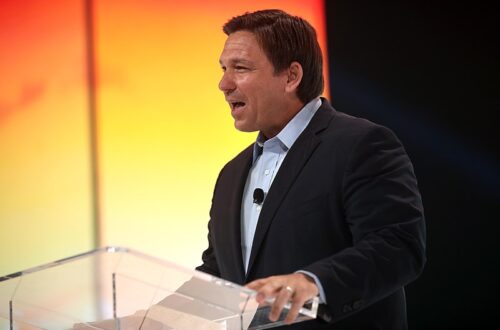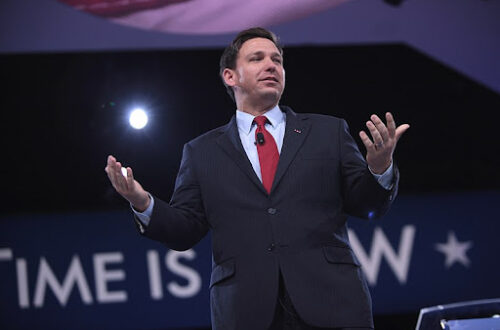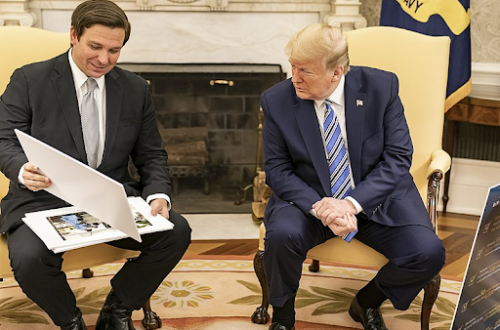Eight lives were taken in Atlanta when one man assaulted three spas across the city. Six of those lives had Asian blood, and all the businesses were Asian-owned.
In response, countless words have been expressed, countless signs waved, countless protests held, and President Biden and Vice-President Harris even made statements.
This article is not about the tragedy in Atlanta, nor is it about the hate crimes committed against Asian Americans, which more than doubled across the nation in 2020 despite overall hate crimes decreasing.
This article is, rather, centered around one word: nascency.
Some call the Asian American community a model minority, others call it a target of racism and fetishization. However, from the lens of American and Floridian politics, it is simply nascent — not yet fully formed, in the process of being born.
I am not here to belittle the vibrancy of the cultures whose complexities are systematically and ubiquitously reduced and constrained by the West, which perceives them as a monolith.
I am here to point out political implications for the Asian Pacific Islander Desi American community. These implications, these politics, start at the individual level.
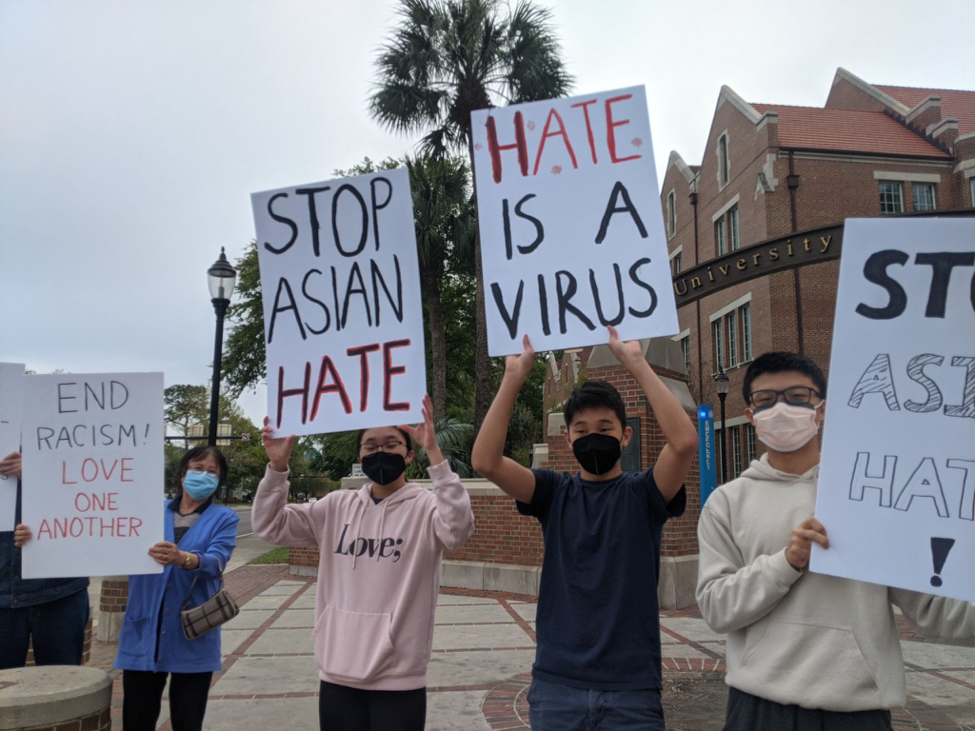
Dr. Danling, left, and three young Asian Americans from the Gainesville community protesting hate crimes against Asians. (Adi Basu-Dutta/Florida Political Review)
On March 20, the Gainesville Chinese community organized a few protests. Dr. Danling Fu, a professor at the University of Florida School of Teaching and Learning, came to the corner of West University Avenue and 13th Street. She was joined by participants young and old, Asian and non-Asian, carrying signs they made themselves.
Fu, speaking on the scapegoating of the APIDA community, said, “The government did not do a great job before, so now [they] blame the Chinese virus.”
Her friend, Bill Lange, a white man carrying a sign that read ‘ASIANS HELPED BUILD AMERICA,’ chimed in that this was a global problem: racism. With his graven voice, he told how his wife emigrated from China decades ago without formal high school education. He spoke of how she could not find a decent job in America, but now she has two college degrees.
“Isn’t that the kind of people we want here?” Lange asks.
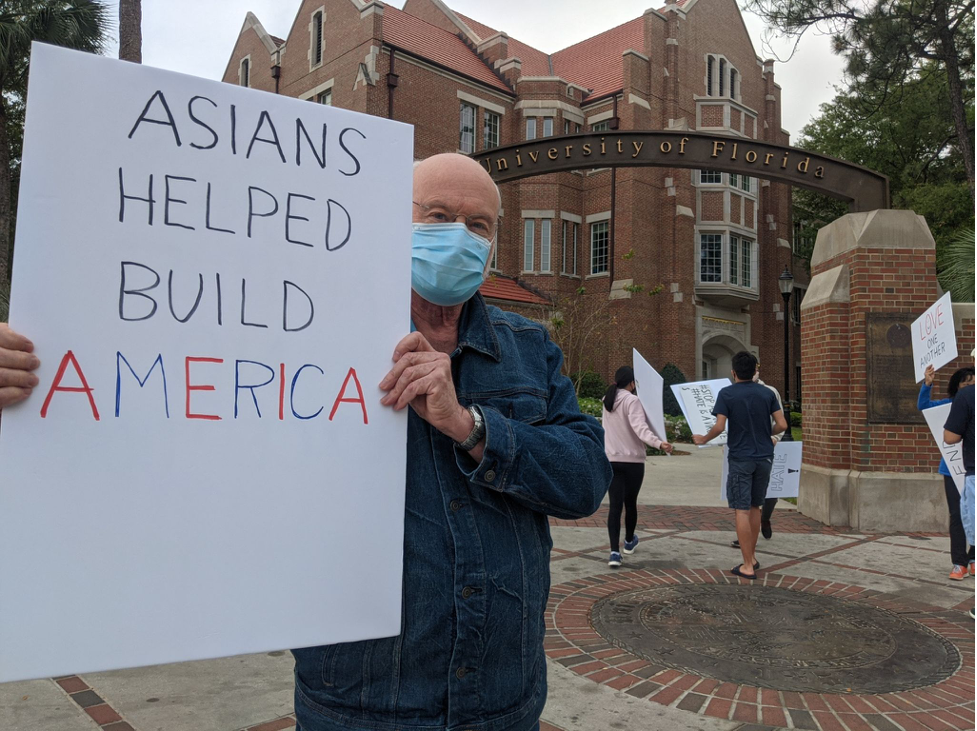
Bill Lange with his sign in front of the University Avenue entrance to UF. (Adi Basu-Dutta/Florida Political Review)
Only about 3% of Floridians can be classified as Asian, as of 2019. Only one of Florida’s current federal representatives is Asian: District 7’s Stephanie Murphy (D), born in Vietnam. There are no strong lobbyist groups for Asians in Tallahassee. Democrats have caucuses for Black Floridians, Caribbean Floridians, Muslim Floridians, but not specifically Asian Floridians. Republicans, too, host none.
The lesson here is simple: in order to get anything done for Asian Americans in the larger structure of Florida politics, it has to be in the context of diversity and in solidarity with other minorities. There has to be cooperation between multiple groups that feel like ‘the other’ in Florida, or in America overall.
Diversity was a central theme in Saturday night’s candlelit vigil organized by Gainesville’s Chinese community that Lange and Fu were a part of. I suspect diversity will also be featured in the follow-up protests promised for next week. Same goes for most such protests anywhere in the U.S.
This puts the movement for Asian American justice squarely on the political left. Republicans in Florida and the rest of the country, to put it mildly, are not known to rally around calls for diversity.
The spike in Asian hate crime is just that. A spike.
That’s my opinion, but I would bet that 2021 sees things go back to normal. Of course, ‘normal’ should not be what any of us strive for. We should strive for better.
Can the same force that drives people to donate millions to the victims and survivors of Atlanta’s shooting be applied to make sure that America changes for the better?
I don’t know, because the APIDA community is nascent.
Right now, they are largely on the political left. This doesn’t mean they will be forever, though.
Much like in the Latinx community, there are distinct sub-groups that may lean more conservative.
Murphy voted ‘yes’ for the tough-on-immigration Kate’s Law in 2017. She almost faced an Asian American Republican opponent in her 2020 race. Yukong Zhao, who came in third in his primary, was born in China.
Neither party will risk political capital to specifically improve the lot of Asian Americans unless there is a crisis like a former president throwing around terms like ‘China-virus.’ That’s a shame, since some sub-groups like Hmong Americans and Vietnamese Americans do face higher rates of poverty that are seldom addressed, with refugee stories that are seldom heard.
What does that mean?
Well, Asian Americans need to be in coalitions to affect change in racial equality or income equality or education or business regulation. That’s a given.
In Florida, the relative non-existence of Asian names in state headlines and voting lines means local APIDA communities will have to live with being accessory to political changes, unless they produce a strong leader who can whip up a rocking campaign or they produce more voters. As Florida’s economy develops and demands jobs that require more educated workers, the latter may come true sooner than we think.
Isn’t that the kind of people we want here?
Featured image: One of many protest sites organized by the Gainesville Chinese community. (Adi Basu-Dutta/Florida Political Review)
Check out other recent articles from the Florida Political Review here.
